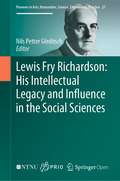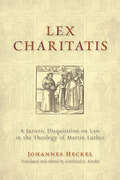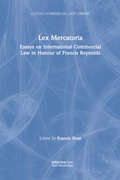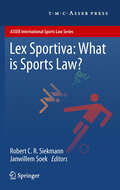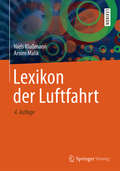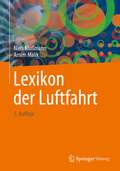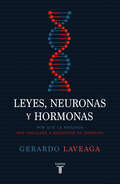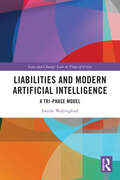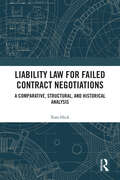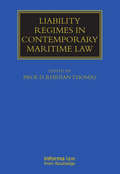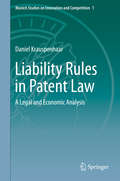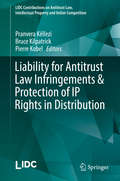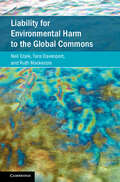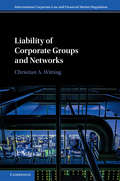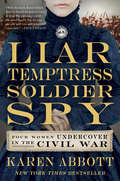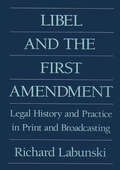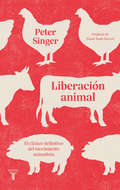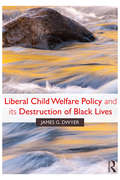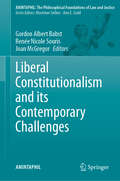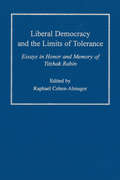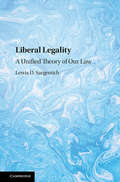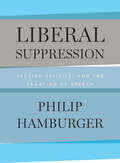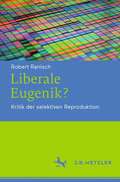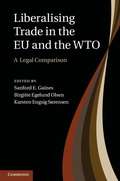- Table View
- List View
Lewis Fry Richardson: His Intellectual Legacy And Influence In The Social Sciences (Pioneers in Arts, Humanities, Science, Engineering, Practice #27)
by Nils Petter GleditschThis is an open access book. Lewis F Richardson (1981-1953), a physicist by training, was a pioneer in meteorology and peace research and remains a towering presence in both fields. This edited volume reviews his work and assesses its influence in the social sciences, notably his work on arms races and their consequences, mathematical models, the size distribution of wars, and geographical features of conflict. It contains brief bibliographies of his main publications and of articles and books written about Richardson and his work and discusses his continuing influence in peace research and international relations as well as his attitude to the ethical responsibilities of a scientist. It will be of interest to a wide range of scholars. This book includes 11 chapters written by Nils Petter Gleditsch, Dina A Zinnes, Ron Smith, Paul F Diehl, Kelly Kadera, Mark Crescenzi, Michael D Ward, Kristian Skrede Gleditsch, Nils B Weidmann, Jürgen Scheffran, Niall MacKay, Aaron Clauset, Michael Spagat and Stijn van Weezel.Lewis F Richardson occupied an important position in two academic fields as different as meteorology and peace research, with academic prizes awarded in both disciplines.In peace research, he pioneered the use of mathematical models and the meticulous compilation of databases for empirical research.As a quaker and pacifist, he refused to work in preparations for war, paid a heavy prize in terms of his career, and (at least in the social sciences) was fully recognized as a pioneering scholar only posthumously with the publication of two major books.Lewis Fry Richardson is one of the 20th century’s greatest but least appreciated thinkers—a creative physicist, psychologist, meteorologist, applied mathematician, historian, pacifist, statistician, and witty stylist. If you’ve heard of weather prediction, chaos, fractals, cliometrics, peace science, big data, thick tails, or black swans, then you have benefited from Richardson’s prescience in bringing unruly phenomena into the ambit of scientific understanding. Richardson’s ideas continue to be relevant today, and this collection is a superb retrospective on this brilliant and lovable man.Steven Pinker, Johnstone Professor, Harvard University, and the author of The Better Angels of Our Nature and Enlightenment Now
Lex Charitatis: A Juristic Disquisition on Law in the Theology of Martin Luther (Emory University Studies in Law and Religion)
by Johannes HeckelThis substantial work by one of Europe's most respected twentieth-century legal minds unpacks Luther's doctrine of law, showing how it derived from his central theological concern, justification by faith. "When Johannes Heckel's Lex Charitatis appeared more than half a century ago, it brought new clarity to the much-disputed issue of Luther's understanding of the law and of God's governance of his created order. The Wittenberg reformer's use of the language of 'two kingdoms' and 'two governances' is still fiercely debated; having Heckel's work in English will assist scholars and students alike in putting Luther's insights to use in the context of twenty-first-century problems." -- Robert Kolb, Concordia Seminary
Lex Mercatoria: Essays on International Commercial Law in Honour of Francis Reynolds
by Francis D. RoseThis collection of essays has been written in honour of Francis Reynolds upon his retirement, in recognition of his great service to the law during his distinguished career. They cover the areas in which Francis Reynolds has been most active – English commercial and maritime law in an international context. Topics covered include contract law, the law of agency, carriage of goods by sea, international sale of goods, bankers’ commercial credits and conflict of laws.
Lex Sportiva: What is Sports Law?
by Robert C.R. Siekmann Janwillem SoekThe important theme "What is Sports Law?" was the topic of the international Conference on "The Concept of Lex Sportiva Revisited", which took place in Jakarta in late 2010. Academics and practitioners are still in debate to agree on this concept as is evident in this book. This book not only contains the worked out contributions of this Conference, but also other related chapters on the subject. It produces a reassessment of the content of Sports Law and its terminology keeping a close eye on the current literature. The book appears in the ASSER International Sports Law Series, under the editorship of Prof. Dr. Robert Siekmann, Dr. Janwillem Soek and Marco van der Harst LL.M.
Lexikon der Luftfahrt
by Niels Klußmann Arnim MalikDas Lexikon bietet als zuverlässiges Kompendium zur Luftfahrt sorgfältig ausgearbeitete Einträge zu Themenfeldern wie Flugzeugbau, Flugwetter, Luftrecht, Flugsicherheit sowie Fluglinien- und Flughafenbetrieb. Die Stichwörter geben Auskunft über Zusammenhänge innerhalb der Aviatik aus technischer, organisatorischer, kommerzieller und historischer Sicht. Mit Angaben zu zahlreichen Internet-Adressen wird auf weitere Recherchemöglichkeiten hingewiesen. Für die 3. Auflage des Buchs wurden 2.500 Einträge aktualisiert und neu hinzugefügt.
Lexikon der Luftfahrt
by Niels Klußmann Arnim MalikDas faktenreiche Lexikon ist ein zuverlässiges Kompendium für alle, die sich mit der Fliegerei und den angrenzenden Bereichen der Luftfahrt beschäftigen. Für Ingenieure, Piloten und Mitarbeiter von Fluggesellschaften ist dieses Werk ebenso informativ wie für ambitionierte Luftfahrtinteressierte. Die vierte Auflage des Buches enthält aktuelle Lexikoneinträge, deren Umfang wieder deutlich erweitert wurde. Zu vielen Bereichen der Luftfahrt, wie Flugzeugbau, Flugwetter, Luftrecht, Flugsicherheit sowie Fluglinien- und Flughafenbetrieb, kann der Leser sorgfältig ausgearbeitete Artikel finden. Sie geben Auskunft über Zusammenhänge innerhalb der Aviatik aus technischer, organisatorischer, kommerzieller und historischer Sicht. Zahlreiche Internet-Adressen eröffnen die Möglichkeit zur weiteren Recherche.
Leyes, neuronas y hormonas: Por qué la biología nos obligará a redefinir el derecho
by Gerardo Laveaga¿Cuál será el futuro del Derecho ahora que las ciencias nos confirman que somos máquinas biológicas y que nuestra conducta no obedece a las leyes sino a nuestras neuronas y hormonas? «Gerardo Laveaga enfrenta un tema central para el futuro del Derecho y la ciencia jurídica: establecer en qué medida las conductas humanas están determinadas por factores biológicos y químicos.» José Ramón Cossío «Neurobiología y justicia se enlazan en este libro para brindar una perspectiva innovadora de una y la otra. Imprescindible para quienes disfruten una lectura inteligente y estén en busca de argumentos para demostrar que Biología y Derecho ya no podrán entenderse y estudiarse por separado.» Eric García-López «Gerardo Laveaga sostiene que la obediencia al Derecho responde a necesidades y emociones básicas; específicamente, el apego y el miedo. Esta perspectiva cuestiona la forma en que hemos entendido el Derecho en la historia de la humanidad.» Mónica G onzález Contró «El autor ofrece un texto erudito, polémico y bien argumentado, que pretende decodificar la complejidad de la conducta jurídica con ayuda de las ciencias biológicas.» Diego Valadés
Liabilities and Modern Artificial Intelligence: A Tri-Phase Model (Law and Change)
by Estelle WallingfordThis book addresses how private law liability should be assigned in contexts where modern forms of AI are deployed.AI as a technology holds the potential to radically improve global society, yet the pace of its advancement far outstrips the pace at which legal systems are responding. This book explores legal approaches to AI, how AI should be legally characterised, and proposes an overarching theoretical liability framework termed the Tri-Phase AI Liability Model. This framework is flexible in nature and considers the type of AI, the context in which it is deployed, who has the most control over the AI system and the capacity of a deployed AI. In response, this book brings greatly needed clarity to the evolving landscape of AI governance, aiding in resolving existing and emerging private law challenges.This book is a timely response to the urgent need to resolve private law liabilities and will appeal to legal professionals, policy makers, and scholars looking to understand or contribute to the current and future governance of AI within private law.
Liability Law for Failed Contract Negotiations: A Comparative, Structural, and Historical Analysis
by Tom HickThis book provides the European structure of liability for failed contract negotiations through a comparative lens, with wider lessons for an international context.The book demonstrates that all the analyzed legal systems, in Belgium, France, Germany, Italy, and the Netherlands, can be best understood through a binary structure in their approach to pre-contractual liability, or culpa in contrahendo. This structure consists of two key elements: first, a general liability framework that allows for compensation of pure economic loss based on certain qualified conduct, such as negligence; and second, an implicit obligation to contract, which, though not explicitly recognized, is presumed in most systems. The book argues that this dual framework provides valuable insights into ongoing scholarly debates and the challenges practitioners face in cases of failed contract negotiations. Drawing on these insights, it proposes a more effective approach to the obligation to contract: one that encourages parties to collaborate in reaching an agreement voluntarily rather than imposing one upon them.This book will be of interest to researchers in the field of comparative contract and tort law, European private law, and private law theory.
Liability Regimes in Contemporary Maritime Law
by D. Rhidian ThomasThis book addresses the topical and current issues in maritime law and brings them together into a coherent strand by the common perspective of liabilities for the professional reader. Liability Regimes in Contemporary Maritime Law appeals to both the industry and the legal profession and provides a degree of analysis and discussion, while also bringing together in a single volume the essential interest in a range of individual subject areas.
Liability Rules in Patent Law
by Daniel KrauspenhaarThe primary purpose of a patent law system should be to enhance economic efficiency, in particular by providing incentives for making inventions. The conventional wisdom is that patents should therefore be strictly exclusive rights. Moreover, in practice patent owners are almost never forced to give up their right to exclude others and receive only a certain amount of remuneration with, for instance, compulsory licensing. Other economically interesting patent-law objectives, however, include the transfer and dissemination of knowledge. Mechanisms exist by which the patent owner decides if he or she would prefer exclusive or non-exclusive rights, for instance the opportunity to declare the willingness to license and create patent pools. But it is questionable whether these mechanisms are sufficient and efficient enough in view of the existence of patent trolls and other problems. This work challenges the conventional wisdom to a certain extent and makes proposals for improvements.
Liability for Antitrust Law Infringements & Protection of IP Rights in Distribution (LIDC Contributions on Antitrust Law, Intellectual Property and Unfair Competition)
by Bruce Kilpatrick Pierre Kobel Pranvera KëlleziThis book gathers international and national reports from across the globe on key questions in the field of antitrust and intellectual property.The first part discusses the allocation of liability for infringement of antitrust laws between corporations and individuals. The book explores the criminal or administrative sanctions available against corporations, companies or group of companies, and individuals, such as employees or directors. A detailed international report explores the major trends and challenges in this field and provides an excellent comparative study of this complex and challenging subject.The second part examines whether intellectual property rights are sufficiently protected to ensure a fair return on investments made by manufacturers and distributors. This question comes at a time where distribution is facing deep and radical changes with the Internet. To what extent this is an opportunity or a threat to the sustainability of distribution systems of differentiated and IP protected goods is the question. This book brings together the current legal responses across a number of European countries and elsewhere in the world, all summarised and elaborated in an international report.The book also includes the resolutions passed by the General Assembly of the International League of Competition Law (LIDC) following a debate on each of these topics, which include proposed solutions and recommendations. The LIDC is a long-standing international association that focuses on the interface between competition law and intellectual property law, including unfair competition issues.
Liability for Environmental Harm to the Global Commons (Cambridge Studies on Environment, Energy and Natural Resources Governance)
by Ruth Mackenzie Neil Craik Tara DavenportThis book examines liability for environmental harm in Antarctic, deep seabed, and high seas commons areas, highlighting a unique set of legal questions: Who has standing to claim environmental harms in global commons ecosystems? How should questions of causation and liability be addressed where harm arises from a variety of activities by state and non-state actors? What kinds of harm should be compensable in global commons ecosystems, which are remote and characterized by high levels of scientific uncertainty? How can practical concerns such as ensuring adequate funds for compensation be resolved? This book provides the first in-depth examination and evaluation of current rules and possible avenues for future legal developments in this area of increasing importance for states, international organizations, commercial actors, and legal and governance scholars. This title is part of the Flip it Open Programme and may also be available Open Access. Check our website Cambridge Core for details.
Liability of Corporate Groups and Networks (International Corporate Law and Financial Market Regulation)
by Christian A. WittingWhat happens when a corporate subsidiary or network company is unable to pay personal injury victims in full? This book sets out to tackle the 'insolvent entity problem', especially as it arises in cases of mass wrongdoing such as those involving asbestos exposure and defective pharmaceuticals. After discussing the nature of corporate groups and networks from the perspectives of business history, organisation studies, and social theory, the book assesses a range of rules and proposed rules for extending liability for personal injuries beyond insolvent entities. New proposals are put for an exception to the rule of limited liability and for the development of a flexible new tort based on conspiracy that encompasses not only control-based relationships but also horizontal coordination between companies. The book concludes with a general discussion of lessons learned from debates about extended liability and provides guidelines for the development of new liability rules. Features a detailed proposal for the development of a statutory exception to limited liability applicable in cases of personal injury. Proposes development of the common law of conspiracy so as to create a new remedy where companies are in commercial agreements with another which is engaged in objectively reckless conduct. Assesses the law on group and network liability in leading common law jurisdictions to provide a better understanding of what gives corporate groups and networks their cohesion and why the law should be prepared to extend liability beyond the insolvent entity.
Liar, Temptress, Soldier, Spy: Four Women Undercover in the Civil War
by Karen AbbottKaren Abbott, the New York Times bestselling author of Sin in the Second City and “pioneer of sizzle history” (USA Today), tells the spellbinding true story of four women who risked everything to become spies during the Civil War.Karen Abbott illuminates one of the most fascinating yet little known aspects of the Civil War: the stories of four courageous women—a socialite, a farmgirl, an abolitionist, and a widow—who were spies.After shooting a Union soldier in her front hall with a pocket pistol, Belle Boyd became a courier and spy for the Confederate army, using her charms to seduce men on both sides. Emma Edmonds cut off her hair and assumed the identity of a man to enlist as a Union private, witnessing the bloodiest battles of the Civil War. The beautiful widow, Rose O’Neale Greenhow, engaged in affairs with powerful Northern politicians to gather intelligence for the Confederacy, and used her young daughter to send information to Southern generals. Elizabeth Van Lew, a wealthy Richmond abolitionist, hid behind her proper Southern manners as she orchestrated a far-reaching espionage ring, right under the noses of suspicious rebel detectives.Using a wealth of primary source material and interviews with the spies’ descendants, Abbott seamlessly weaves the adventures of these four heroines throughout the tumultuous years of the war. With a cast of real-life characters including Walt Whitman, Nathaniel Hawthorne, General Stonewall Jackson, detective Allan Pinkerton, Abraham and Mary Todd Lincoln, and Emperor Napoleon III, Liar, Temptress, Soldier, Spy draws you into the war as these daring women lived it.Liar, Temptress, Soldier, Spy contains 39 black & photos and 3 maps.
Libel and the First Amendment: Legal History and Practice in Print and Broadcasting
by Richard E. LabunskiAs the recent cases involving William Westmoreland and Ariel Sharon re-veal, libel suits filed against media organizations have become an increas-ingly serious problem in recent years. The potential for inhibiting news coverage or even putting a news organization out of business has never been greater. This book explores historical and contemporary issues relating to libel suits against media organizations, emphasizing the consequences of the development of libel law for the First Amendment. It also considers the spe-cial problems that broadcasters have with libel suits and their potentially in-hibiting effect on television news coverage. Labunski traces the development of libel law largely from 1964, when the Supreme Court entered the libel arena for the first time and began a twenty-year effort to develop standards that are fair to both sides. He de-scribes the hostile environment which journalists must enter when they de-fend themselves in court. He also demonstrates the complexity and inconsis-tency that have resulted from the state-by-state creation of libel standards. Labunski offers suggestions, some more easily accomplished than others, that will help us get out of the libel "morass" which twenty years of Su-preme Court activity and lower court litigation have produced. This book will be of particular value to students of the First Amendment, communica-tion scholars, working journalists, and anyone who wants to better under-stand the complex development of libel laws and the effect of libel suits on news coverage.
Liberación animal: El clásico definitivo del movimiento animalista
by Peter SingerLa Biblia de quienes luchan por los derechos de los animales, con prólogo de Yuval Harari. Este revolucionario libro inspiró, desde su publicación original en 1975, un movimiento mundial de defensa de los derechos de los animales que aspira a transformar nuestra actitud hacia ellos y eliminar la crueldad que les infligimos. En Libración animal, Peter Singer denuncia el «especismo» (el prejuicio de creer que existe una especie, la humana, superior a todas las demás) y expone la escalofriante realidad de las granjas industriales y los procedimientos de experimentación con animales, echando abajo las justificaciones que los defienden y ofreciendo alternativas a un dilema moral, social y medioambiental. Este libro es un persuasivo llamamiento a la conciencia, la decencia y la justicia y una lectura esencial tanto para el ya convencido como para el escéptico. La crítica ha dicho...«La documentación deSinger no es ni retórica ni emocional, sus argumentos son rigurosos y formidables, ya que no basa su caso en principios personales o religiosos, ni en conceptos filosóficos altamente abstractos, sino en posiciones morales que la mayoría de nosotros ya aceptamos.»The New York Times Book Review «Un libro importantísimo que cambiará el modo en que muchos de nosotros miramos a los animales y, en última instancia, a nosotros mismos.»Chicago Tribune
Liberal Child Welfare Policy and its Destruction of Black Lives
by James G. DwyerHow can we end the inter-generational cycle of poverty and dysfunction in the US's urban ghettos? This ground-breaking and controversial book is the first to provide a child-centered perspective on the subject by combining a wealth of social science information with sophisticated normative analysis to support novel reforms—to child protection law and practice, family law, and zoning— that would quickly end that cycle. The rub is that the reforms needed would entail further suffering and loss of liberty for adults in these communities, and liberal advocacy organizations and academics are so adult-centered in their sympathies and thinking that they reflexively oppose any such measures. Liberals have instead promoted one ineffectual parent-focused program after another, in an ideologically-driven quest for the magic pill that can save both adults and children in these communities at the same time. This `insider critique’ of liberal child welfare policy reveals a dilemma that liberals have yet to face squarely: there is an ineradicable conflict of interests between many young children and their parents, especially in areas of concentrated poverty, and one must choose sides. It is a must read for legal academics, political scientists, urban policy experts, as well as professionals working in social work, law, education, urban planning, legislative offices, and administrative agencies.
Liberal Constitutionalism and its Contemporary Challenges (AMINTAPHIL: The Philosophical Foundations of Law and Justice #12)
by Joan McGregor Gordon Albert Babst Renée Nicole SourisThe edited volume brings together contemporary work by philosophers, legal scholars, and political theorists. This volume presents relevant understandings of the common good, democracy, liberty, and law, and situates them in the context of contemporary countervailing pressures posed by issues in education, access to medical treatment in a pandemic, and the media. Motivated to ascertain how democracy is threatened by a variety contemporary challenges, the authors examine core aspects of law, representative democracy, and constitutionalism to shed light on worrisome contemporary phenomena such as social media-driven conspiracy theories, unequal access to education and medical treatment, among other topics.
Liberal Democracy and the Limits of Tolerance: Essays in Honor and Memory of Yitzhak Rabin
by Raphael Cohen-AlmagerAn irony inherent in all political systems is that the principles that underlie and characterize them can also endanger and destroy them. This collection examines the limits that need to be imposed on democracy, liberty, and tolerance in order to ensure the survival of the societies that cherish them. The essays in this volume consider the philosophical difficulties inherent in the concepts of liberty and tolerance; at the same time, they ponder practical problems arising from the tensions between the forces of democracy and the destructive elements that take advantage of liberty to bring harm that undermines democracy. Written in the wake of the assasination of Yitzhak Rabin, this volume is thus dedicated to the question of boundaries: how should democracies cope with antidemocratic forces that challenge its system? How should we respond to threats that undermine democracy and at the same time retain our values and maintain our commitment to democracy and to its underlying values? All the essays here share a belief in the urgency of the need to tackle and find adequate answers to radicalism and political extremism. They cover such topics as the dilemmas embodied in the notion of tolerance, including the cost and regulation of free speech; incitement as distinct from advocacy; the challenge of religious extremism to liberal democracy; the problematics of hate speech; free communication, freedom of the media, and especially the relationships between media and terrorism.
Liberal Legality: A Unified Theory Of Our Law
by Lewis D. SargentichIn his new book, Lewis D. Sargentich shows how two different kinds of legal argument - rule-based reasoning and reasoning based on principles and policies - share a surprising kinship and serve the same aspiration. <P><P>He starts with the study of the rule of law in life, a condition of law that serves liberty - here called liberal legality. In pursuit of liberal legality, courts work to uphold people's legal entitlements and to confer evenhanded legal justice. Judges try to achieve the control of reason in law, which is manifest in law's coherence, and to avoid forms of arbitrariness, such as personal moral judgment. Sargentich offers a unified theory of the diverse ways of doing law, and shows that they all arise from the same root, which is a commitment to liberal legality.<P> Explores what rule-based law and policy-based law have in common.<P> Proposes a novel conception of the rule of law.<P> Offers a wide view of law and legal reasoning.
Liberal Suppression: Section 501(c)(3) and the Taxation of Speech
by Philip HamburgerIn the course of exempting religious, educational, and charitable organizations from federal income tax, section 501(c)(3) of the Internal Revenue Code requires them to refrain from campaign speech and much speech to influence legislation. These speech restrictions have seemed merely technical adjustments, which prevent the political use of a tax subsidy. But the cultural and legal realities are more disturbing. Tracing the history of American liberalism, including theological liberalism and its expression in nativism, Hamburger shows the centrality of turbulent popular anxieties about the Catholic Church and other potentially orthodox institutions. He argues persuasively that such theopolitical fears about the political speech of churches and related organizations underlay the adoption, in 1934 and 1954, of section 501(c)(3)’s speech limits. He thereby shows that the speech restrictions have been part of a broad majority assault on minority rights and that they are grossly unconstitutional. Along the way, Hamburger explores the role of the Ku Klux Klan and other nativist organizations, the development of American theology, and the cultural foundations of liberal “democratic” political theory. He also traces important legal developments such as the specialization of speech rights and the use of law to homogenize beliefs. Ultimately, he examines a wide range of contemporary speech restrictions and the growing shallowness of public life in America. His account is an unflinching look at the complex history of American liberalism and at the implications for speech, the diversity of belief, and the nation’s future.
Liberale Eugenik?: Kritik der selektiven Reproduktion
by Robert RanischAnwendungen der Gendiagnostik und Reproduktionsmedizin erlauben es Wunscheltern, immer weiter auf das Erbgut ihrer Nachkommen Einfluss zu nehmen. Eine solche „liberale Eugenik“ wird mittlerweile auch in der Philosophie und Bioethik befürwortet. Wo liegen aber die Ursprünge eines solchen Denkens und wie ist eine umfassende Fortpflanzungsfreiheit zu bewerten? Ausgehend von einer freiheitlichen Ethik leistet die Studie eine immanente Kritik an der liberalen Eugenik und entwirft dabei eine eigene Position zum Umgang mit neuen gentechnischen Möglichkeiten.
Liberalising Trade in the Eu and the Wto
by Sanford E. Gaines Birgitte Egelund Olsen Karsten Engsig SørensenThis comparison of EU and WTO approaches to common trade-liberalisation challenges brings together eighteen authors from Europe and America. Together they explore fundamental legal issues, such as the role of general principles of law, the role of the judiciary in the development of law, the effect of the principle of non-discrimination and the elimination of non-discriminatory barriers to trade. The contributions also examine the most recent developments in trade law across a full range of trade issues, including TBT and SPS, services, intellectual property, customs rules, safeguards, anti-dumping and government procurement. Adopting a comparative perspective throughout, this volume sheds light on today's trade law and suggests paths forward for each system through the perennial tensions between open, non-discriminatory trade and strongly held national values and objectives.
Liberalism and the Limits of Justice
by Michael J. SandelA liberal society seeks not to impose a single way of life, but to leave its citizens as free as possible to choose their own values and ends. It therefore must govern by principles of justice that do not presuppose any particular vision of the good life. But can any such principles be found? And if not, what are the consequences for justice as a moral and political ideal? These are the questions Michael Sandel takes up in this penetrating critique of contemporary liberalism. This new edition includes a new introduction and a new final chapter in which Professor Sandel responds to the later work of John Rawls.
